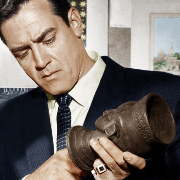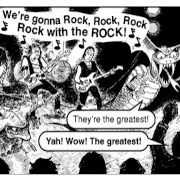|
DJJIB-DJDCT posted:I suppose the critical question here is what is more important to you: staying up all night to party, or relieving poor families from a vice that leads to all sorts of emotional, physical and sexual abuse? Yeah but this guy is saying that drug-use wouldn't exist in his communist utopia after poverty etc have all been eradicated. So even if we assume for the sake of argument that we can all agree to stop doing drugs and drinking alcohol etc, in order to help pave the way for the material conditions that will ultimately usher in communism, what then? Let's say under communism I wanna go to a rave with my friends, and want to stay up all night dancing and having fun with them. I'm going to need some MDMA in order to do that, at the very least. Brain dead argument imo
|
|
|
|

|
| # ? May 26, 2024 10:32 |
|
"can drug use exist under communism" is a perfectly spherical argument you libs
|
|
|
|
i dont think the hypothetical communist society im describing is especially utopian. the important detail is that it was never capitalist, so there arent any vestiges of capitalist influence
|
|
|
|
Al! posted:"can drug use exist under communism" is a perfectly spherical argument you libs do you think blisters will still happen under communism
|
|
|
|
scary ghost dog posted:i dont think the hypothetical communist society im describing is especially utopian. the important detail is that it was never capitalist, so there arent any vestiges of capitalist influence ⚪
|
|
|
|
DJJIB-DJDCT posted:just to differentiate my own stance here. The whole reason for the temperance movement was because people realized that alcohol was a social poison, mostly affecting the working class, that was preventing them from organizing against the cause of their problems. Capitalism was causing misery, alcohol was used to alleviate the symptoms but made things much worse. Insanely good post
|
|
|
|
in my hypothetical society drugs are able to make you fly, but they are only given to sworn party members
|
|
|
|
Wow this thread became a mess.
|
|
|
|
what if communism but everyone's body's backwards but the clothes are backwards too like kidnplay - u think that would mean all the clothes except kidnplays are backwards or just kidnplays
|
|
|
|
thats more like a circle than a sphere
|
|
|
|
maxwellhill posted:what would it look like if a fed asset got lazy and used their main account to try to produce a wedge issue
|
|
|
|
ironic that the guys who dont like drugs are reminding me of my stoned friends coming up with highdeas about how society should be organized
|
|
|
|
Thank you to the upper middle class professionals of the CSPAM forum for quitting alcohol so that I, an epic member of the working class, can thrive.
|
|
|
|
What about smoking? IIRC nicotine is psychoactive, and smoking is cool and a good way to meet ppl at parties. Drugs ftw
|
|
|
|
1400 pages of MKULTRA and Jolly West and the Dulles Bros. Two days of princess cat shenanigans and the freaks come out.
|
|
|
|
multistability posted:What about smoking? IIRC nicotine is psychoactive, and smoking is cool and a good way to meet ppl at parties. Drugs ftw psychoactive is different than psychedelic and you know it. however i am a pack a day smoker so i have to agree with you sorry
|
|
|
|
Wait, did Frosted Flakes just "greetings, fellow leftists!" the entire thread in his pro-temperance screed? Bro you're kinda shady sometimes. Also the Temperance movement lead to Prohibition, which was incredibly bad and whose stupid echos gently caress up the Western world to this day.
|
|
|
|
Al! posted:if your revolution does not have mescaline, its not my revolution speaking of, peyote is both critically endangered (due to americans) and fully legal to grow basically every where except america (nazi country). they're cute little cacti and not very difficult.
|
|
|
|
|
|
|
|
Azathoth posted:No, we are reading them, you just really suck I'm not reading them, they suck.
|
|
|
|
Al! posted:trying to imagine what the russian revolution would have looked like if anyone involved was sober
|
|
|
|
i guess lenin was sober, that little nerd
|
|
|
|
great, well thought out post positing an insane position. easily refuted by literally any of the revolutions against capitalism in history
|
|
|
|
Will we be allowed to masturbate and have premarital sex in the in serious-business-for-real version of anglo communism?
|
|
|
|
Tricky D posted:Will we be allowed to masturbate and have premarital sex in the in serious-business-for-real version of anglo communism? i imagine its encouraged. i also imagine gay sex to be double encouraged. i can imagine anything you ask me to, there are no limits
|
|
|
Tricky D posted:Will we be allowed to masturbate and have premarital sex in the in serious-business-for-real version of anglo communism? pleasure is counter-revolutionary comrade
|
|
|
|
|
Al! posted:trying to imagine what the russian revolution would have looked like if anyone involved was sober Russia, temperance movement, 1858–1860 “Mass anger led to the formation of the temperance movement. The movement emerged in Russia’s western provinces as entire villages ruled to abstain from drinking while picketing liquor establishments. By 1859, temperance committees spread across 32 Russian provinces. As alcohol sales plummeted, retail prices dropped to 0.5 rubles a bucket, and in some localities retailers offered vodka free. But protests nonetheless gained momentum as 220 drinking shops were destroyed during the summer of 1859. The government arrested 780 people in an attempt to prevent the movement from expanding. “ Drinking and Temperance Among Soviet Workers, 1900-1930 (with an addendum on drinking and sobriety in contemporary Russia ) “The most sustained effort at controlling private drinking behaviors, and hence social relations , identities and cultural values of the working class, began in the 1920s, as Soviet authorities attempted to transform former peasants into efficient workers who shared their worldview and their commitment to building socialism.” “ The primary working-class behaviour that Soviet authorities deemed to be old, uncultured, and "bourgeois" was alcoholism . Newspapers and the trade union press throughout the 1920s abound with descriptions of drunkenness as "bourgeois degeneration", and as evidence of meshchanskii (middle-class) or nepovskyi (NEP-ish) decay. According to Soviet rhetoric, a socialist worker was a sober wo “Within months of the revolution. however, the Bolsheviks had dramatic evidence o f alcohol ' s effect on crowds . In November and December 1917, a series of riots, sparked by struggle s over control of liquor supplies, by soldiers and civilians alike rocked Petrograd . Soldiers garrisoned i n other towns raided shops and warehouses for alcohol in drunken orgies that lasted days . In many case s rioters maimed and killed many people and destroyed much property before loyal Red Guard units could re It is not surprising, therefore, that in 1918 the Council of People's Commissars (Sovetnarodnykh komissarov or Sovnarkom) nationalized the liquor industry, declaring the existing stock of alcoholic beverages state property .' The following year the new government decided to continue prohibition , introduced in 1914 by the tsarist government, by passing a law entitled "On the banning of the manufacture and sale of spirits, alcoholic drinks, and other products containing ethanol within the territory of the RSFSR ." The law provided for strict punishment and imprisonment of anyone who made, sold, or traded in illicit spirits .” “Even prior to the reintroduction of the liquor monopoly, party visionaries focused their attention on the problem of working-class drinking . Given the seemingly more crucial and immediate problems facing the new regime, this attention to drinking might seem misplaced, unless viewed within the contex t of state-building . The Bolsheviks assumed that the industrial working class would provide the necessary social support for the new revolutionary regime, the "dictatorship of the proletariat," just as it had for the most part supported the October Revolution . In the midst of postrevolutionary social disintegration, however, the Bolsheviks found themselves, at ltemporarily, the vanguard of a fragmented and nearly non-existent class” “In the early 1920s, therefore, the issue of drinking became critical for the Soviet state as th e Bolsheviks came face to face with their number one quandary : workers did not act right. The behavior o f the new working class, especially those fresh from the village, did not meet Bolshevik expectations : they came late to work, if at all ; they broke their machines ; they ignored the authority of bosses ; and above all, they drank themselves into oblivion .” Two Tolstoys and a Lenin—Temperance and Prohibition in Russia “The understanding of temperance as opposition to imperial autocracy is traced through the antistatist teachings of Leo Tolstoy and early Bolsheviks, including the prohibitionists Vladimir Lenin and Leon Trotsky. Despite official opposition to “subversive” temperance activism, at the outbreak of World War I in 1914 Tsar Nicholas II made Russia the first prohibitionist state, though the loss of state revenue paved the way for the revolutions of 1917. Lenin maintained a prohibition against the vodka trade, which was only undone after Lenin’s death by Joseph Stalin, who reintroduced the tsarist-era vodka monopoly in the interests of state finance.” Lenin the Prohibitionist “Death is preferable to selling vodka!” Lenin declared prior to the revolution. True to his prohibitionist principles, he held fast to that conviction after seizing power. Even with vodka’s counterrevolutionary threat subsiding, Lenin’s ruling Sovnarkom, or Council of People’s Commissars… nationalized all alcohol production facilities and existing alcohol stocks. In 1919, Sovnarkom forbid distilling “by any means, in any quantity and at any strength” – punishable by confiscation of all property and a minimum of five years in Siberian labor camps.” “Whatever the peasant wants in the way of material things we will give him, as long as they do not imperil the health or morals of the nation,” Lenin famously declared late in life. “But if he asks for ikons or booze – these things we will not make for him. For that is definitely retreat; that is definitely degeneration that leads him backward. Concession of this sort we will not make; we shall rather sacrifice any temporary advantage that might be gained from such concessions.” [url=To Seize the Means of Production or the Means of Destruction: Temperance, Prohibition, and British Columbia’s Working Class] “Drugs have long been used as a tool for domination. This could be for economic purposes, such as was seen in the Russian vodka monopoly or the British opium trade in China, or as a path to domination, as seen in the spread of alcohol amongst Indigenous populations.15 Those amongst the classes which had either systematically been exposed to alcohol or else been driven into its arms through poor living conditions sometimes recognized the deleterious relationship. Some fought against it, while others accepted alcohol as a necessary coping mechanism to get through their days. In some cases, leaders amongst oppressed populations recognized the use of alcohol as a tool of oppression and sought to eradicate it in order to mobilize the downtrodden classes and overthrow their oppressors. “ “In Smashing the Liquor Machine: a global history of prohibition (2021), Mark Schrad sets out to illuminate temperance’s role as an international social liberation movement, criticizing nearly a century’s worth of historians who have got it wrong. He sets up his argument as contrary to the “culture-clash narrative” that suggests that “prohibition was a weapon of the powerful white majority, used to subordinate and ‘discipline’ already marginalized poor, urban, immigrant, and African American communities.”17 He also seeks to dispel myths surrounding particular members of the temperance movement as morally driven crusaders, fanatics, and fools, offering a compelling argument as he showcases that prominent members of the temperance movement were not anti-alcohol per se, but rather anti-alcohol business.18 While his criticism of temperance and prohibition historiography is correct in suggesting that they are too often one- sided and his investigation of this leads him to recast previously misremembered information, he suggests that temperance and prohibitionism were inherently progressive.19 In such a large and controversial movement both sides of the debate are bound to be partially true, and there is no one theory to describe the diversity within 19th and 20th century temperance movements within both a national and international context.” “The Russian vodka monopoly was first implemented by Ivan the Terrible in the 1550s. The sale of alcohol became the prerogative of the Tsar, and vodka became the liquor of choice because was it was both cheaper to make and more addictive than beer or wine. The stereotypical association of Russians and vodka is the result of “hundreds of years of autocratic political and economic decisions, which built the financial might” of the Russian empire “on the drunken misery of the Russian people.”41 One traveler corroborates the class bias of the vodka monopoly, noting that drunkenness was “nowhere to be seen but with the lower ranks.”” “In the years leading up to the revolution Trotsky argued that: The propertied classes and the state bear responsibility for that culture which cannot exist without the constant lubricant of alcohol...But their historical guilt is still incomparably more terrible. Through fiscal means they turn alcohol, that physical, moral and social poison, into the main source of nourishment for the state. Vodka not only makes the people incompetent to manage their own destiny, it also covers the expenditures of the privileged. What a real devil’s system! The Bolshevik revolution took place in the middle of WWI, after Tsar Nicholas had already enforced national prohibition to aid in the war effort. Once the Bolsheviks had seized power, one of the only policies Lenin decided to carry over was the prohibition of alcohol. He proclaimed that: ...the proletariat as a rising class does not need drunkenness that would deafen or provoke them...they need only clarity, clarity, and again clarity. The communist upbringing of the working class requires the rooting out of all vestiges of the capitalist past, especially such a dangerous vestige as drunkenness. Lenin was committed to maintaining prohibition despite how it crippled the Russian economy which the Bolsheviks inherited, as he saw it as essential for Russia’s progress and future.”
|
|
|
|
they should have called it communschism from the start.
|
|
|
|
mycomancy posted:Wait, did Frosted Flakes just "greetings, fellow leftists!" the entire thread in his pro-temperance screed? Bro you're kinda shady sometimes. He's going Protestant. Grape juice from now on.
|
|
|
|
mawarannahr posted:He's going Protestant. Grape juice from now on. A Protestant Frosted Flakes full of faux wine is going to have some absolutely nuclear takes on women.
|
|
|
|
If I lived in a post scarcity Utopia I would simply move to a trailer in the desert and smoke space weed all day because I am a poorly conceived caricature of a person suffering from depression
|
|
|
|
mycomancy posted:A Protestant Frosted Flakes full of faux wine is going to have some absolutely nuclear takes on women. As long as Prods venerate Saint Mary, and Saint Mariam of Magdala, and so believe femininity is an integral part of sanctity, I’m sure it would be fine.
|
|
|
|
scary ghost dog posted:thats not what im saying. im saying that in a hypothetical communist world where none of the indoctrinations and influences of capitalism ever took root, recreational psychedelic drug use probably wouldnt exist, and might not even be fun. that is the specific point i am arguing. i do psychedelic drugs and have fun on a monthly basis and have for some years really makes u think
|
|
|
|
multistability posted:What about smoking? IIRC nicotine is psychoactive, and smoking is cool and a good way to meet ppl at parties. Drugs ftw folks are instead using zyn pouches at work
|
|
|
|
seems very 'capitalist realism' to view the primary usage of drugs as an escape from reality even in a post capitalist or non capitalist communist society.
|
|
|
|
i personally love to do meth and will always partake in a bit on the weekend despite the pleasure bureaus warnings
|
|
|
|
Ziggy Smalls posted:seems very 'capitalist realism' to view the primary usage of drugs as an escape from reality even in a post capitalist or non capitalist communist society. "For the master’s tools will never dismantle the master’s house. They may allow us temporarily to beat him at his own game, but they will never enable us to bring about genuine change." Let's escape capitalism first, then reality.
|
|
|
|
DJJIB-DJDCT posted:"For the master’s tools will never dismantle the master’s house. They may allow us temporarily to beat him at his own game, but they will never enable us to bring about genuine change." Is someone talking about using drugs to dismantle capitalism?
|
|
|
|
Ziggy Smalls posted:Is someone talking about using drugs to dismantle capitalism? They're talking about indulging something that poisons the working class now because someday, when full communism is achieved, it might be enjoyable.
|
|
|
|

|
| # ? May 26, 2024 10:32 |
|
MDMA specifically is a excellent tool for building solidarity and camaraderie among the working class in my experience. And it's really enjoyable too and I imagine it would be even more so under communism. And I don't think it's even that bad for you if used responsibly
|
|
|


































